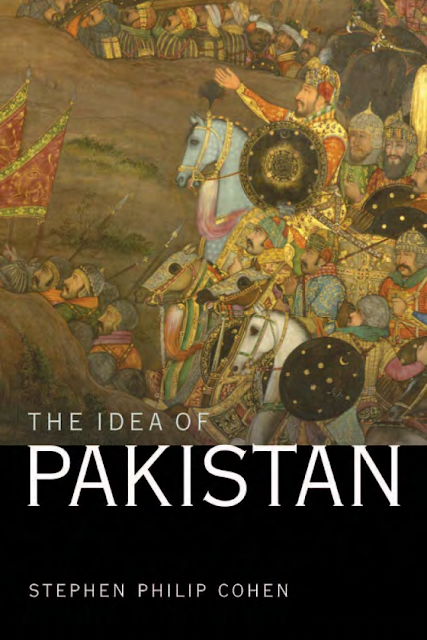Book Name
The Idea of Pakistan
Edition: 2004
Author:Stephen Philip Cohen
Book Publishers
brookings institution press washington, D.C.
Publish Date: 2004
Language. English
Category ?
Book Code 246
Pages 396
Rs 1400
Book Quality Black Paper
Whatsapp +92312-9775152
E-mail onlinebookshop.pk@gmail.com
About
In recent years Pakistan has emerged as a strategic player on the world stageboth as a potential rogue state armed with nuclear weapons and as an American ally in the war against terrorism. But our understanding of this country is superficial. To probe beyond the headlines, Stephen Cohen, author of the prize-winning India: Emerging Power, offers a panoramic portrait of this complex countryfrom its origins as a homeland for Indian Muslims to a militarydominated state that has experienced uneven economic growth, political chaos, sectarian violence, and several nuclear crises with its much larger neighbor, India. Pakistans future is uncertain. Can it fulfill its promise of joining the community of nations as a moderate Islamic state, at peace with its neighbors, or could it dissolve completely into a failed state, spewing out terrorists and nuclear weapons in several directions? The Idea of Pakistan will be an essential tool for understanding this critically important country.
CONTENTS
Preface vii
Introduction 1
one The Idea of Pakistan 15
two The State of Pakistan 39
three The Army’s Pakistan 97
four Political Pakistan 131
five Islamic Pakistan 161
six Regionalism and Separatism 201
seven Demographic, Educational, and
Economic Prospects 231
eight Pakistan’s Futures 267
nine American Options 301
Notes 329
Index 369
Preface
It has taken me forty-four years to write this book—the
length of time I have been studying Pakistan (and India). My early inter-
ests were in the role of the military, but I was unable to visit Pakistan until
1978, as an earlier application for a visa had been turned down by the
government of Zulfiqar Ali Bhutto.
When I did visit Pakistan for the first time I was surprised to discover
that my personal “idea of Pakistan” was wildly inaccurate: not better, not
worse, just different. That trip led to a book, The Pakistan Army. Research
for that book was made possible by General Zia ul-Haq, who promptly
banned it, although he eventually told an aide to “let the professor’s book
be published.” Zia’s decision was only one of the many paradoxes I
encountered in studying Pakistan, and the mixture of hope and frustration
reflected in The Pakistan Army is to be found here as well.
This book is not quite comparable to India: Emerging Power. It focuses
primarily on internal dynamics, not strategic policy. One important dif-
ference between the two states is that Pakistan’s domestic and external
policies are more entwined than those of India, partly because of Pak-
istan’s more perilous geostrategic position and partly because the domi-
nant Pakistan army looks both inward and outward. Writing this book
provided me with the opportunity to extend my knowledge of Pakistan
beyond the army and to gain a fuller understanding of the country’s polit-
ical parties, Islamists, civilian elites, and various ethnic, linguistic, andsectarian minorities. Above all, I have learned more about the contested
idea of Pakistan.
Many individuals and institutions have assisted me on this journey.
First and foremost, I wish to thank those Pakistanis who have given their
time in innumerable discussions and meetings. My Pakistani friends have
always been courteous and considerate, even when we have disagreed; I
hope that they will find here an accurate representation of their views. In
particular, I would like to thank Moonis Ahmar, Samina Ahmed, Qazi
Hussein Ahmed, Akbar Ahmed, Benazir Bhutto, Pervaiz Iqbal Cheema,
Mahmud Durrani, Ejaz Haider, Husain Haqqani, Pervez Hoodbhoy,
Mushahid Hussain, Rifaat Hussein, Jehangir Karamat, Shaukat Qadir,
Ashraf Jehangir Qazi, Ahmed Rashid, Hasan Askari Rizvi, Najam Sethi,
Aqil Shah, Mohammed Waseem, and innumerable other civilians and
serving officers and officials of the Pakistan government. Some Pakistanis
may disagree with the arguments and conclusions of this book; I hope that
in such cases it will lead to the beginning of a dialogue and not the end of
a friendship.
Many Washington friends and colleagues have generously shared their
knowledge and special insights. Chief among these are Marvin G. Wein-
baum, now of the Middle East Institute and a friend and colleague for
forty years; Nisar A. Chaudhry; Selig Harrison; Rodney Jones; Anatol
Lieven; Polly Nayak; and former ambassadors Dennis Kux, William
Milam, Robert Oakley, and Howard and Teresita Schaffer (whose own
Pakistan project helpfully paralleled the writing of this book).
Brookings has provided me with admirable support and a lively intel-
lectual home for over six years, and I would like to acknowledge the spe-
cial help of my two junior colleagues, Sunil Dasgupta, who provided much
of the research support, and Tanvi Madan, who helped bring the book to
completion. We have been assisted over the years by diligent and hard-
working associates, Azeema Cheema, Meena Mallipeddi, Zaid Safdar,
Taylor Sherman, and Moeed Yusuf. Strobe Talbott contributed, among
other things, the book’s title, and Jim Steinberg provided a meticulous cri-
tique. At the Brookings Institution Press, Vicky Macintyre very ably edited
the manuscript, while Inge Lockwood handled proofreading, and Enid
Zafran indexed the pages. Larry Converse and Susan Woollen were help-
ful in developing the cover and getting the book to print. Generous
viii Prefacesupport for the research and writing of this book was provided by the
Smith Richardson Foundation and the United States Institute of Peace.
As ever, I wish to thank my wife, Roberta, for her unfailing support and
for being my first and best reader and critic.
Finally, I am deeply grateful to my own students, past and present,
including the hundreds of young Pakistanis, Indians, and Chinese who par-
ticipated in the Summer Workshops on South Asian Security issues held
since 1993 in Pakistan, India, Sri Lanka, Nepal, and China. They reinforce
the wisdom of the Latin, docendo discimus (we learn by teaching).











No comments:
Post a Comment